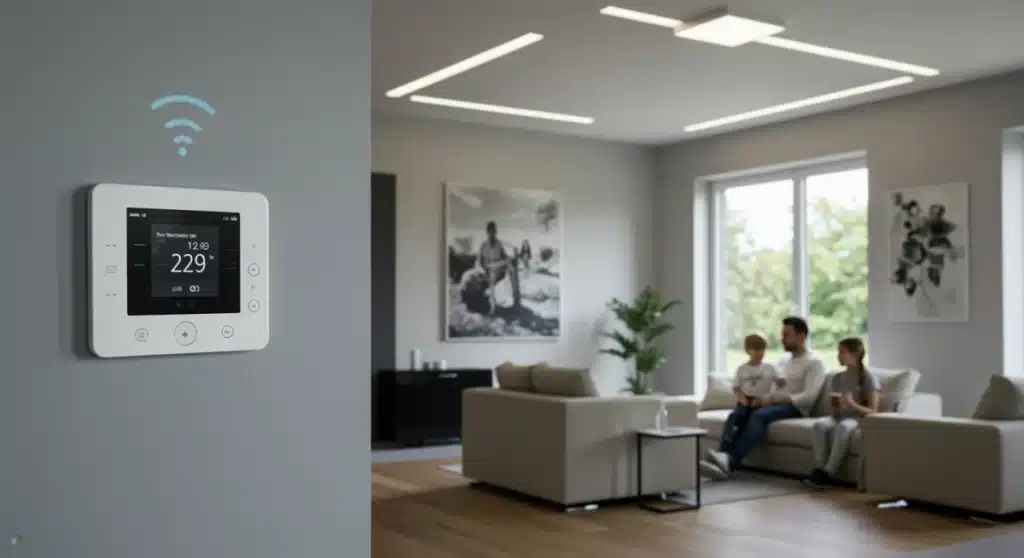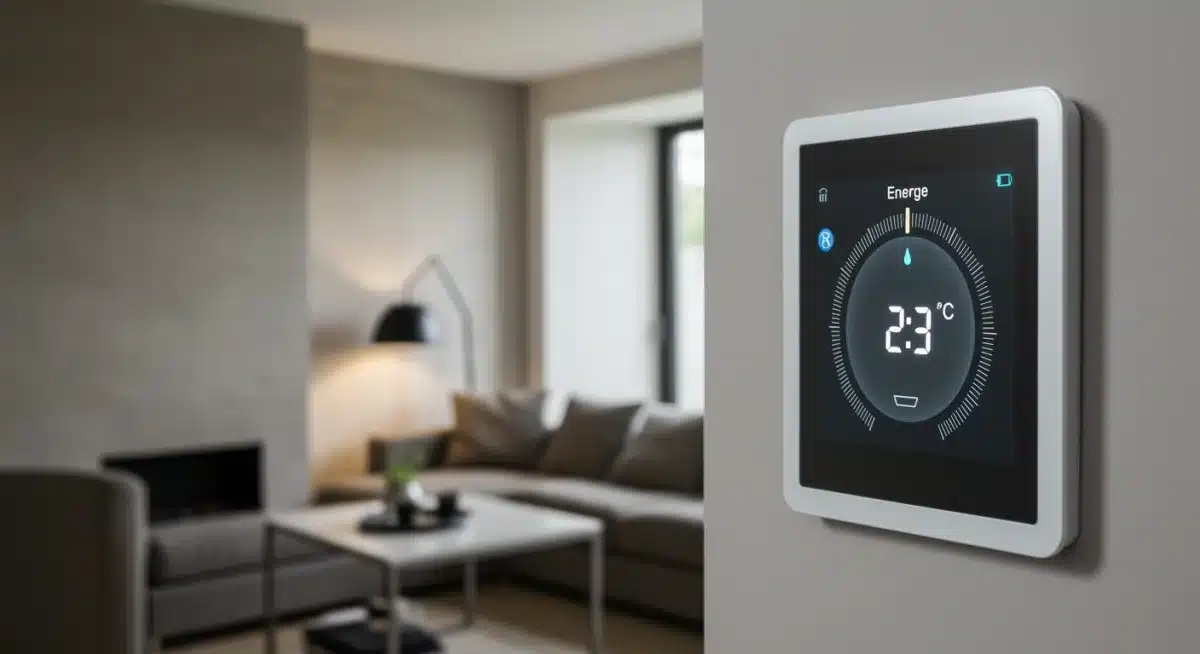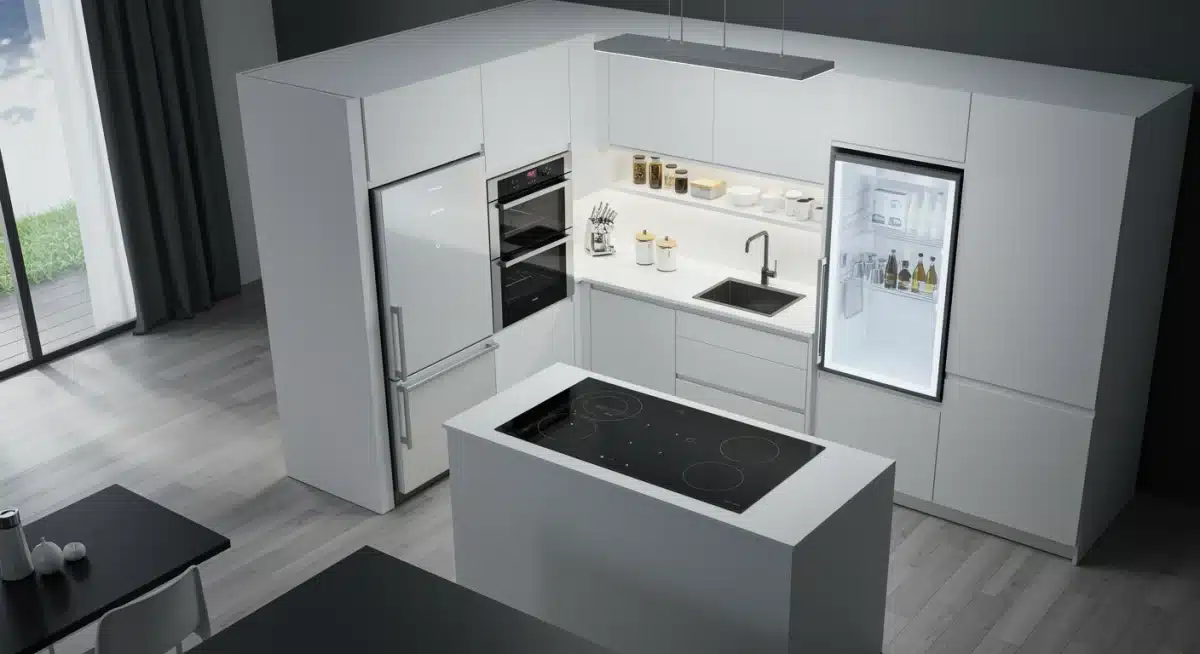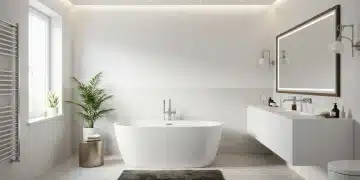Smart Home Upgrades: Boost Your Home Value in 2025

Advertisement
Investing in smart home technology is no longer a luxury but a strategic move for homeowners aiming to significantly boost their property’s market value by 2025, offering both modern living and substantial returns.
In today’s competitive real estate market, understanding how smart home upgrades: increase your home value by 15% in 2025 is crucial. As technology continues to evolve at a rapid pace, integrating intelligent systems into your home offers more than just convenience; it’s a strategic investment that appeals to modern buyers looking for efficiency, security, and connectivity. This guide explores the most impactful smart home enhancements that can provide a significant return on investment, making your property stand out.
Understanding the Smart Home Market in 2025
The smart home market is experiencing exponential growth, driven by consumer demand for integrated, easy-to-use technologies that simplify daily life and enhance comfort. By 2025, smart home features will no longer be considered niche luxuries but rather expected amenities, influencing purchasing decisions and property valuations significantly. Homeowners who proactively adopt these technologies are positioning their properties for higher market appeal and increased resale value.
Advertisement
Modern buyers, particularly younger generations, are highly tech-savvy and place a premium on homes that are move-in ready with advanced capabilities. They seek properties that offer immediate benefits like energy savings, enhanced security, and seamless integration with their digital lifestyles. Ignoring these trends means potentially leaving money on the table when it’s time to sell.
The Shift in Buyer Expectations
What buyers consider essential in a home has dramatically changed. Gone are the days when a renovated kitchen and bathroom were the sole drivers of value. Today, connectivity and automation play a pivotal role. A home that can be controlled from a smartphone, that learns its occupants’ habits, and that proactively manages its own systems is a powerful selling point.
- Demand for Efficiency: Smart thermostats and energy monitoring systems are highly sought after.
- Enhanced Security: Integrated smart locks, cameras, and alarm systems provide peace of mind.
- Seamless Connectivity: Voice assistants and whole-home Wi-Fi solutions are becoming standard.
- Improved Comfort: Automated lighting and climate control contribute to a superior living experience.
By understanding these evolving expectations, homeowners can make informed decisions about which smart upgrades will yield the greatest impact on their property’s value. The goal is not just to add technology, but to integrate solutions that genuinely improve the living experience and offer tangible benefits to future owners.
Advertisement
Energy Efficiency: Smart Thermostats and Lighting
One of the most tangible benefits of smart home technology, and a significant driver of increased home value, is improved energy efficiency. Smart thermostats and intelligent lighting systems are at the forefront of this revolution, offering homeowners considerable savings on utility bills while reducing their carbon footprint. These upgrades are highly attractive to potential buyers, who are increasingly conscious of both environmental impact and ongoing living costs.
Smart thermostats, such as Nest or Ecobee, learn your family’s habits and adjust temperatures automatically, optimizing energy use without sacrificing comfort. They can be controlled remotely via smartphone, allowing you to fine-tune your home’s climate from anywhere. This level of control and efficiency is a major draw for prospective buyers.
Automated Lighting Solutions
Smart lighting systems go beyond simple on/off switches. They allow for intricate control over brightness, color, and scheduling, creating ambiance and enhancing security. Systems like Philips Hue or Lutron Caséta integrate seamlessly with other smart devices, offering a complete home automation experience.
- Cost Savings: LED smart bulbs consume significantly less energy and last longer than traditional bulbs.
- Convenience: Control lights from your phone, voice assistant, or set schedules for automatic operation.
- Security: Program lights to turn on and off while you’re away, giving the impression that someone is home.
- Ambiance: Adjust color and brightness to suit any mood or occasion.
The combination of smart thermostats and advanced lighting systems creates a home that is not only more comfortable and convenient but also significantly more economical to run. These features translate directly into a higher perceived value for buyers, who recognize the long-term financial benefits and modern lifestyle advantages.
Enhanced Security: Smart Locks and Surveillance Systems
Security is a paramount concern for homeowners, and smart home technology offers advanced solutions that greatly enhance peace of mind. Investing in smart locks and integrated surveillance systems is a powerful way to increase your home’s desirability and value. These systems provide a robust layer of protection, giving both current and future occupants confidence in their safety.
Smart locks, like August or Schlage Encode, allow keyless entry via smartphone, keypad, or even fingerprint. They offer the ability to grant temporary access to guests or service providers, and they provide activity logs, so you always know who is entering and exiting your home. This level of control and monitoring is a significant upgrade from traditional locks.

Comprehensive Surveillance
Smart surveillance systems, including doorbell cameras and outdoor security cameras, offer 24/7 monitoring and remote access to live feeds. Brands like Ring, Arlo, and Google Nest provide high-definition video, two-way audio, and motion detection alerts directly to your smartphone. These systems deter potential intruders and provide crucial evidence in case of an incident.
- Remote Monitoring: Check on your home from anywhere in the world.
- Instant Alerts: Receive notifications for suspicious activity or package deliveries.
- Deterrence: Visible cameras act as a strong deterrent to crime.
- Integration: Seamlessly connect with other smart home devices, such as smart lights or alarms.
The integration of smart locks and surveillance systems creates a comprehensive security ecosystem that is highly valued by modern buyers. A home equipped with these features offers superior protection and convenience, making it a more attractive and valuable asset in the real estate market.
Smart Kitchen and Appliances: The Heart of the Home
The kitchen often serves as the heart of the home, and smart technology is transforming this space into a hub of efficiency, convenience, and culinary innovation. Upgrading your kitchen with smart appliances can significantly boost your home’s appeal and value, as buyers increasingly seek modern, integrated solutions that simplify meal preparation and household management.
Smart refrigerators can manage grocery lists, display recipes, and even monitor food freshness. Smart ovens can be preheated remotely, and some models even offer self-cleaning cycles or integrated air frying capabilities. These appliances save time, reduce waste, and add a touch of luxury that resonates with discerning buyers.
Beyond Basic Appliances
The smart kitchen extends beyond major appliances to include smaller, yet impactful, devices. Smart coffee makers can brew your morning coffee on schedule, while smart scales and blenders can assist with healthy meal prep. Even smart faucets that dispense precise measurements or specific temperatures are gaining popularity.
- Convenience: Automate cooking tasks and manage appliances remotely.
- Efficiency: Reduce food waste and optimize energy consumption.
- Modern Aesthetic: Integrated smart appliances contribute to a sleek, contemporary kitchen design.
- Added Value: A smart kitchen is a significant selling point, appealing to a wide range of buyers.
Investing in a smart kitchen creates a highly functional and desirable space that combines cutting-edge technology with everyday utility. This fusion of innovation and practicality makes a home more attractive and valuable, ensuring it stands out in a crowded market.
Entertainment and Connectivity: Whole-Home Audio and Wi-Fi
In an increasingly connected world, robust entertainment and seamless connectivity are no longer luxuries but essential components of a modern home. Investing in whole-home audio systems and optimizing your Wi-Fi infrastructure are smart upgrades that significantly enhance lifestyle appeal and, consequently, your home’s market value. Buyers today expect a home that can effortlessly support their digital lives, from streaming entertainment to remote work and online learning.
Whole-home audio systems, such as Sonos or multi-room setups from brands like Denon or Yamaha, allow occupants to enjoy music or podcasts in any room, all controlled from a central app or voice assistant. These systems create an immersive audio experience that elevates daily living and entertaining, making the home feel more luxurious and technologically advanced.

Optimizing Home Network Infrastructure
A fast, reliable, and ubiquitous Wi-Fi network is the backbone of any smart home. Upgrading to a mesh Wi-Fi system (e.g., Google Nest Wifi, Eero) ensures strong signal coverage throughout the entire property, eliminating dead spots and supporting numerous connected devices simultaneously. This is crucial for seamless operation of all smart home features and for meeting the demands of modern households.
- Ubiquitous Connectivity: Strong Wi-Fi signal in every corner of the house.
- Seamless Streaming: Enjoy high-quality audio and video without buffering.
- Enhanced Productivity: Support for multiple users working or learning remotely.
- Future-Proofing: A robust network can handle future smart home devices and higher bandwidth demands.
By providing a superior entertainment experience and a rock-solid network foundation, these upgrades create a home that is truly ready for the demands of 2025 and beyond. This commitment to connectivity and modern living significantly boosts buyer interest and overall property valuation.
Long-Term Value: Maintenance and Future-Proofing
While immediate gains from smart home upgrades are appealing, considering their long-term value, maintenance, and future-proofing potential is equally important. Investing in technologies that offer reliability, ease of updates, and compatibility with emerging standards ensures that your smart home remains valuable and functional for years to come. This foresight is a key factor in maximizing your return on investment.
Opt for established brands and platforms that have a track record of consistent software updates and strong customer support. This minimizes the risk of obsolescence and ensures your devices remain secure and compatible with new technologies. A system that can adapt and evolve is far more valuable than one that becomes outdated quickly.
Scalability and Integration
Consider the scalability of your smart home system. Can you easily add new devices or expand existing functionalities without a complete overhaul? Choose platforms that support a wide range of third-party integrations, allowing for a truly interconnected home ecosystem. This flexibility is a significant selling point for future buyers who may have their own preferences for smart devices.
- Open Standards: Prioritize devices that support common protocols like Zigbee, Z-Wave, or Matter.
- Modular Design: Select systems that allow for easy expansion and upgrades.
- Professional Installation: For complex systems, professional installation ensures optimal performance and reliability.
- Energy Monitoring: Integrate systems that provide data on energy consumption, allowing for continuous optimization.
By focusing on long-term viability, maintainability, and the potential for future expansion, homeowners can ensure their smart home investments continue to yield benefits and enhance property value well beyond 2025. This strategic approach transforms smart upgrades from mere gadgets into enduring assets.
| Key Upgrade | Value Proposition |
|---|---|
| Smart Thermostats | Significant energy savings and remote climate control, appealing to eco-conscious buyers. |
| Smart Security Systems | Enhanced safety and peace of mind with remote monitoring and access control. |
| Smart Kitchen Appliances | Increased convenience, efficiency, and a modern aesthetic for the heart of the home. |
| Whole-Home Wi-Fi | Reliable, fast internet connectivity throughout the property, essential for modern living. |
Frequently Asked Questions About Smart Home Upgrades
Smart thermostats, advanced security systems (locks and cameras), and integrated lighting typically offer the best ROI. These upgrades appeal to a broad range of buyers due to their energy-saving capabilities, enhanced safety features, and convenience, directly contributing to a higher perceived property value.
While specific figures vary by market and the extent of upgrades, well-chosen and professionally installed smart home technologies can increase your home’s value by 5% to 15% or even more. This is particularly true as smart features become standard expectations for modern buyers.
Many smart home devices are designed for DIY installation, but for complex integrated systems or whole-home solutions, professional installation is recommended. Maintenance typically involves software updates and occasional battery replacements, which are generally straightforward for most homeowners.
While not every buyer is a tech enthusiast, the practical benefits of smart home upgrades, such as energy efficiency, enhanced security, and convenience, appeal to a vast majority. These features are increasingly seen as standard amenities, making a property more attractive and competitive in the market.
Focus on reliable brands, open integration standards (like Matter, Zigbee, Z-Wave), and systems that offer ease of use and updates. Prioritize upgrades that provide clear, tangible benefits like energy savings or security. Avoid overly niche or proprietary systems that might deter future buyers.
Conclusion
The landscape of homeownership is rapidly evolving, and embracing smart home technology is no longer an option but a strategic imperative for those looking to maximize their property’s value. By focusing on key upgrades such as energy-efficient systems, robust security solutions, and integrated kitchen and entertainment technologies, homeowners can significantly enhance their property’s appeal and command a higher price in the competitive 2025 market. These investments not only elevate daily living but also provide a substantial return, positioning your home as a desirable, future-ready asset.





